Actress and Reporter Orelon Sidney: “I’m an Actor With a Damn Good Day Job”
April 12, 2018 | Filed in: Woman of the Week
By her mid-thirties, Orelon Sidney had landed a dream job as an on-air weather reporter for CNN. She loved it just as much as she thought she would—until one day, she didn’t. So she did what almost no one in a stable, lucrative, high-profile position does: She quit, and started a second career as an actress. Today, you might know her from your local weather station (she still does freelance reporting around the country) or from her roles on Stranger Things, Rectify, The Devil’s Knot, and other major shows. Here, she talks about preparing for her career shift, the worst advice she ever got, and the perks of “beginner’s mind.”
I’D DESCRIBE MYSELF AS an actor with a damn good day job. Being a weather reporter was my full-time career for from 1989 to 2005, and now I do it freelance. I have an agent who represents me all over the country, and I can report from anywhere. I’ve loved weather since I was a little girl, and I was passionate about it. Then I got out of the business in 2005, wanting to do something else, but not sure what that was. Unfortunately, I discovered acting instead of dentistry or something more reliable. I was looking for something I loved as much as weather, you know?
GROWING UP IN TEXAS, we had big, nasty tornadoes. They terrified me, but I also wanted to understand them, as a means of comfort. I’m not as much of a weather geek as I used to be, but I still find it compelling. Global warming is very interesting to me. What are we going to know 20 years from now that we don’t know now? I’m also interested in the future of weather reporting—how is the industry going to change?
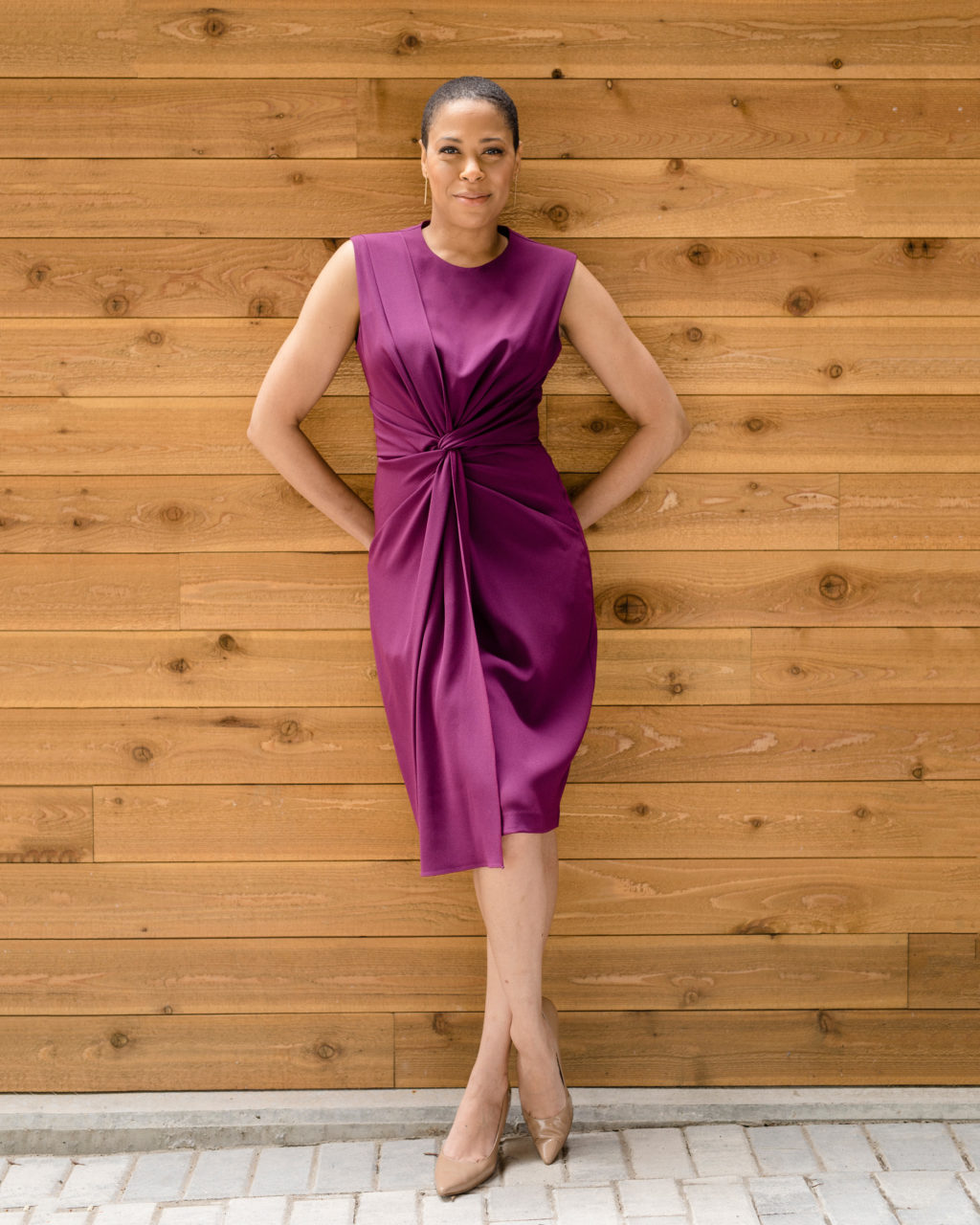
Orelon wears the Taylor dress in deep plum and the Williamina earrings.
IT TOOK ME A LITTLE WHILE to start my meteorology career. I went to college for two years, and had no idea what I wanted to do, so I left and spent five years doing secretarial work. Then I got laid off and thought, This is going nowhere. I need to go back to college, and figure out what I want out of life. I guess I had to figure out what I did not want before I could figure out what I did. So I enrolled at Texas A&M, studied meteorology, and started working at the local TV station while I was still in school. I kept working there for a couple of years after I graduated. Then I went to Channel 2 in Houston, and then to CNN in Atlanta.
I LEFT CNN BECAUSE it was starting to feel been-there, done-that. About three years before I actually left, I remember going into work one day and thinking, Okay. What now? It was weird, because I was at the point where I could have started coasting. I could have just put it on cruise, and let the car go straight through to retirement. But I was restless. I didn’t just need a different job at another TV station—I needed a new career. I needed to move on. It took me a couple of years to plan, and once I left CNN, I had a moment of, “What the hell did I just do?” If I had stayed, I’d probably be a millionaire by now, but I’m not somebody who will be satisfied with my life just because I’m a millionaire. I’m satisfied when I feel like I’m using the tools I have to the fullest. I think everybody has a certain set of talents, and I think that the highest use of yourself is to figure out what your talents are and maximize them.
THE WORST ADVICE I EVER GOT was when a high school teacher told me, “Go get a job that pays you a lot of money, and then you can afford to do what you love in your free time.” I thought that was such a backwards way to approach life, and I still do. If it works for you to just follow the dollar, okay, great, but that’s not me. I went where I was interested, and then figured out how to monetize it. When I was growing up, we were poor, and I didn’t want to be poor anymore, so I am of course attracted to independence and security—but I’ve achieved those things by pursuing something that inspires me.
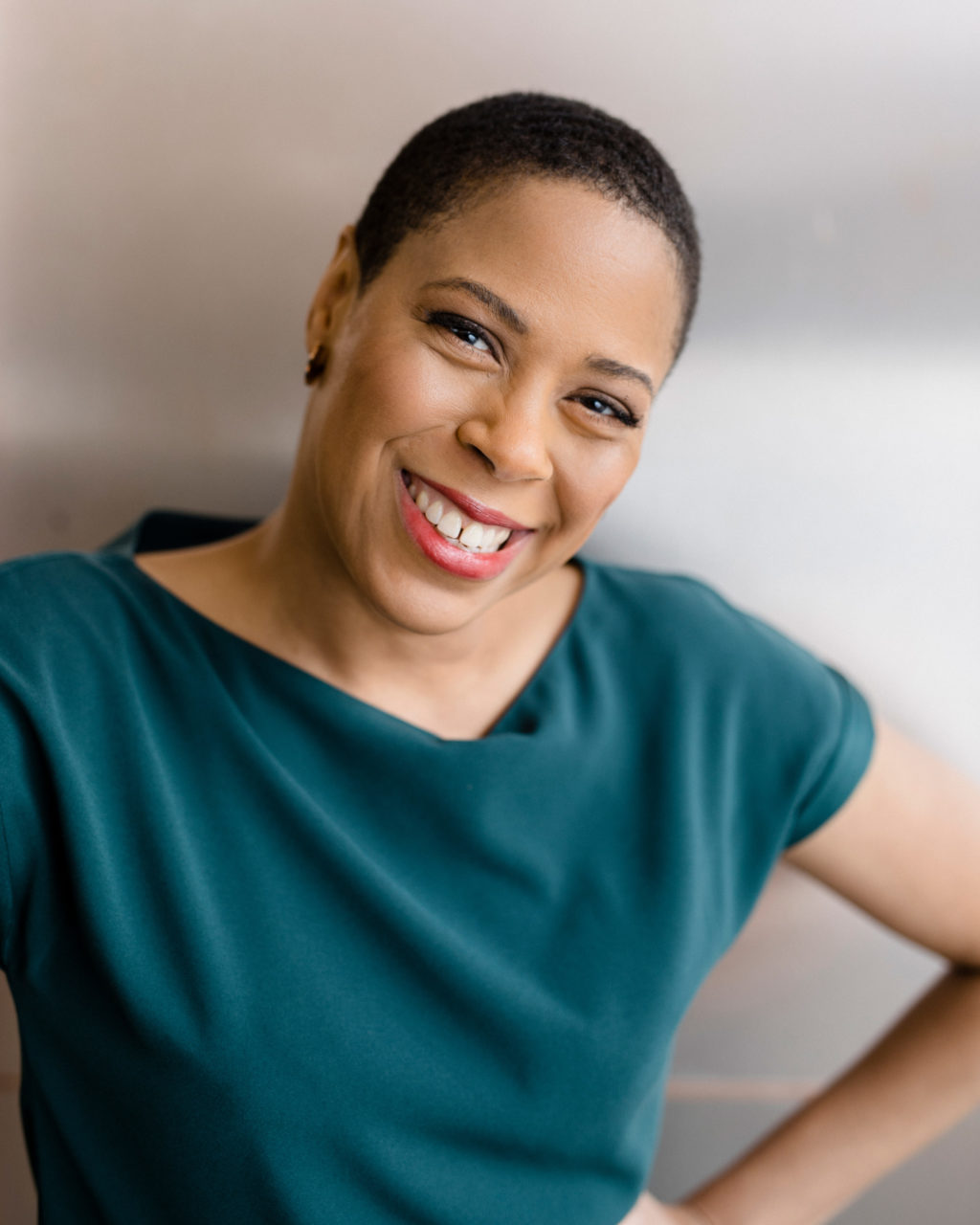
Orelon wears the Betty top in rainforest.
I DID ALL KINDS OF THINGS RIGHT AFTER I LEFT CNN. For a minute I was in music management. I considered interior design. Then I thought, Well, I’ll just go over to the local modeling agency to see if I can get some work. They had a commercial division, and since I’d been in television, I figured maybe I could get cast in TV ads. I signed with the agency, realized I was terrible at acting, started taking classes to get better, and discovered that I really liked it. Then I started booking some television work. I still can’t book an ad to save my life, but I can do television.
I WON’T LIE: There is a certain satisfaction in having safety and security in your job. Sometimes I look at my career change and think, I’ve lost my mind. But I’m having the freaking time of my life. I love being able to set my own schedule. I’m feral now; I don’t think I could go back to a regular full-time job.
A LOT OF ACTORS HAVE A HARD TIME finding their first agent, and I didn’t, because I had my television background to build on. My first five or six roles were all playing reporters. And that was fine, because I thought, One day, somebody’s going to read me for a part that’s different. The next thing I knew, I was cast as a school principal. Then I was a college professor. Then I was a coroner, and then a reporter again. The way I see it, you want to think of your career trajectory as building a pyramid: Build on top of what you’ve already got. I definitely have a type, and I don’t fight it—I usually play authority figures. But I could not care less about how people cast me. It’s a role, honey! Now, I want what every actor wants, which is to make a living in the business and not have to have a second job.
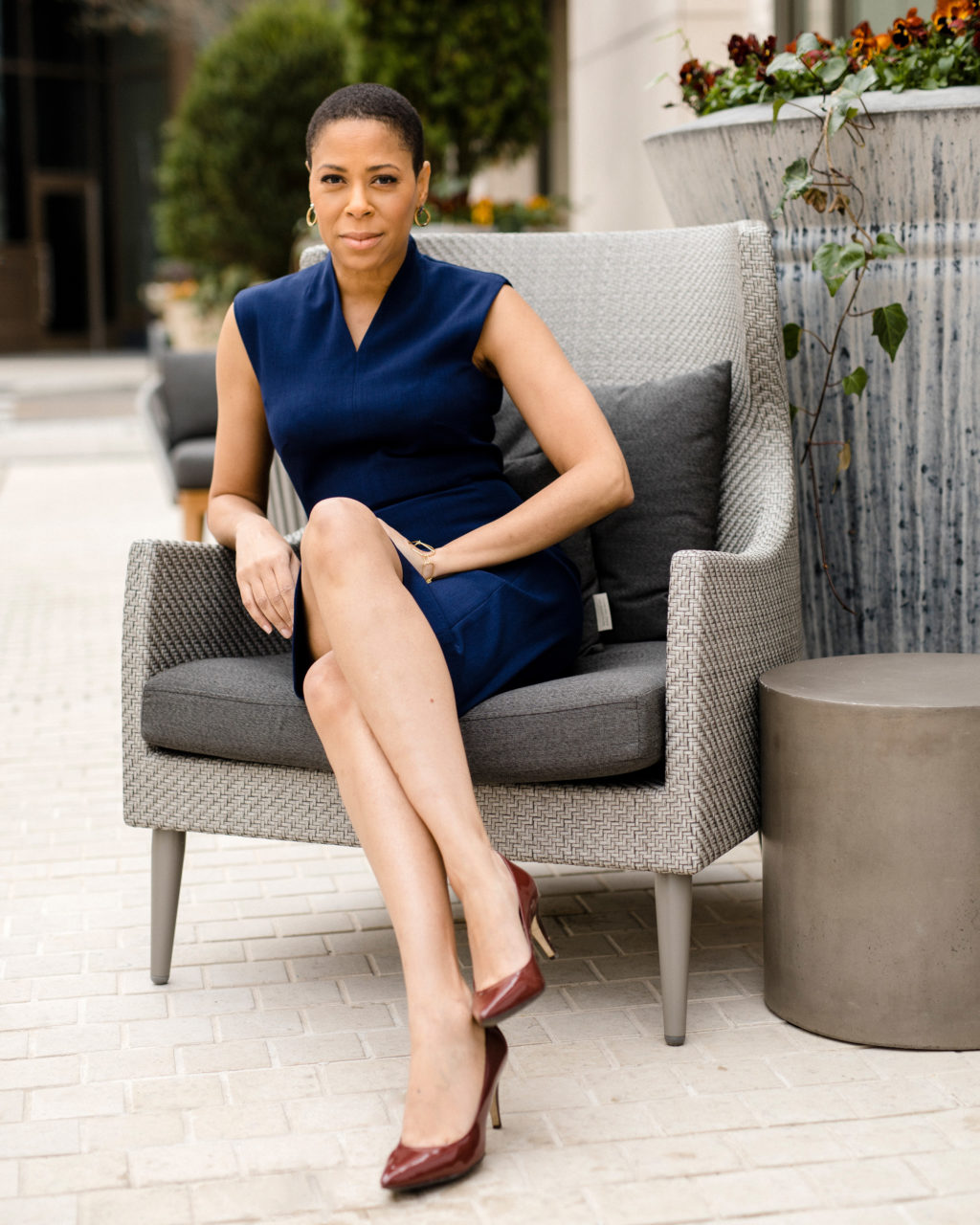
Orelon wears the Aditi dress in galaxy blue, the Cecilia earrings, and the Galatea bracelet.
EVEN IF WE WERE ALL ABLE TO DO WHATEVER WE WANTED, financially, we still wouldn’t necessarily do it, because there are other responsibilities to factor in—families, kids, relationships, things like that. I don’t have children and I’m not married, which is not something I did deliberately. But I am in a situation where I don’t have to worry how my decisions will affect my kids or my partner. And that does afford me a certain freedom.
MY OWN FAMILY MADE ME FEEL like I could do anything. My mother was the kind of person who would say, “Well, why can’t you do that? What’s stopping you?” She gave me the confidence to go forth and grab the bull by the horns. My mom had a very expansive mind. Unfortunately, she was also very sick for most of my life, so she was physically limited—but she was not mentally limited. She read constantly and listened to all kinds of music in the house. Her curiosity rubbed off on people, especially me. She always wanted to go to school and finish her college degree, but she was too sick. She passed away when I was in high school, but she left me with the mindset of, “This is a big world. Go find what you want to do in it.” Today, my father lives here in Atlanta, literally down the street from me. My life is here, with family and friends, and I have no intention of moving to L.A. or anywhere else. That’s what airports are for.
I THINK I’M GOOD AT WHAT I DO because I can make people feel things. I can communicate well. That’s what I think I did best in weather reporting, and that’s what I think I do as an actor. I’m good at connecting with people, and getting them to understand me. And if I can throw in a little humor, it’s even more fun.
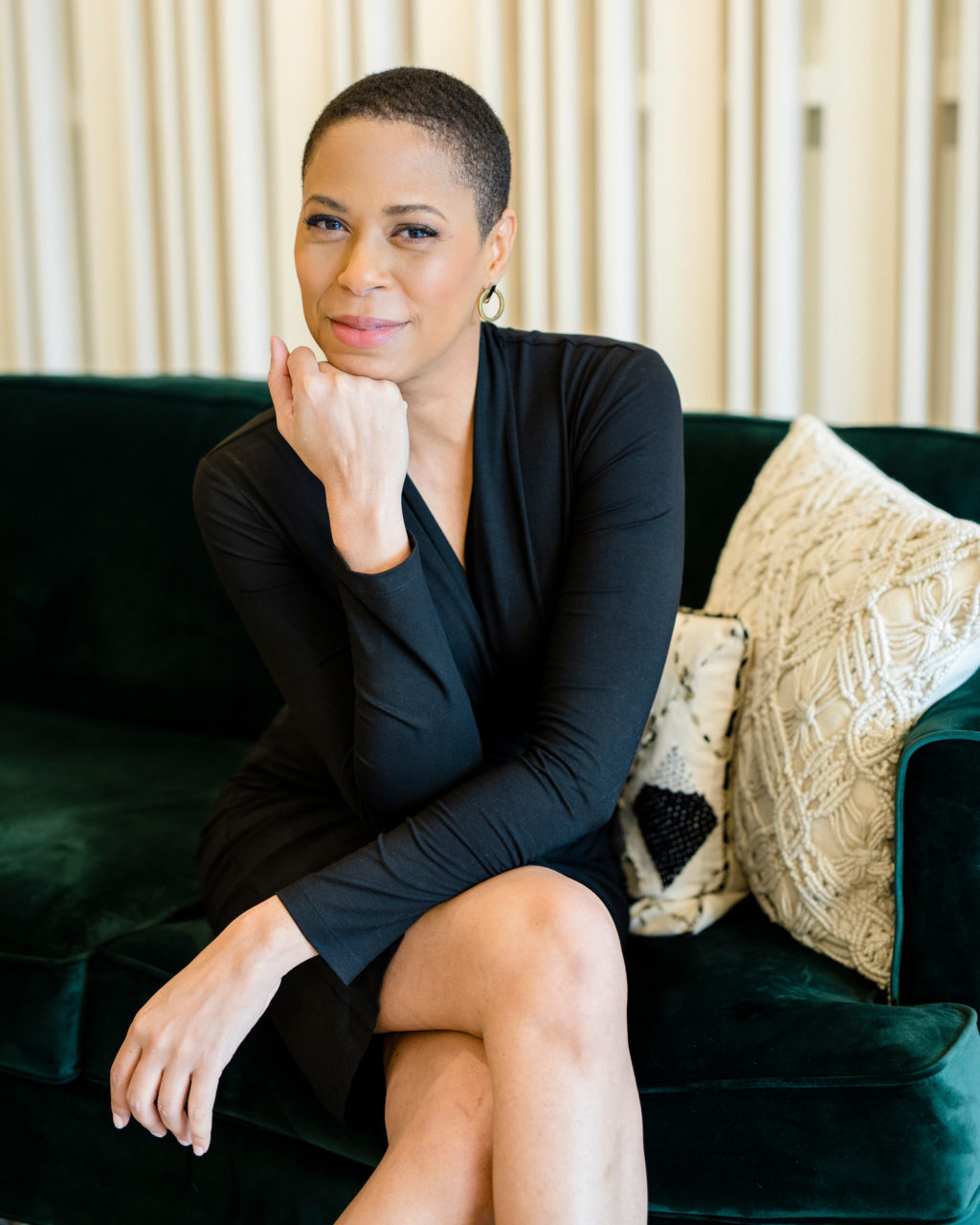
Orelon wears the Fey top and the Soho skirt in black and the Cecilia earrings.
THE SIMILARITIES BETWEEN ACTING AND WEATHER REPORTING are surprising. In both jobs, somebody presents you with a problem, or a question, whether it’s a forecast or a character. My job is to take that away, go in my little cave, analyze it, come up with an interpretation, and then present it to an audience. Then, when I’m done, the lights go off, snap, snap, snap, we’re wrapped. Buh-bye. It’s a different application, but the same process.
TO DEVELOP PERSONAL STYLE, you’ve got to know yourself. Shop around and learn what colors look great on you, and what fits you. For TV, it’s important to wear things that are tailored—there can’t be extraneous fabric. You need to show your shape and silhouette, and you want your face to be the brightest thing in the picture. Really pale colors are horrible on camera, and black isn’t great either, because it doesn’t light very well. I stay away from prints and stripes, because they’re distracting. You want the focus to be your face and what you’re saying, and not what you’re wearing. That’s what I love about MM.LaFleur.
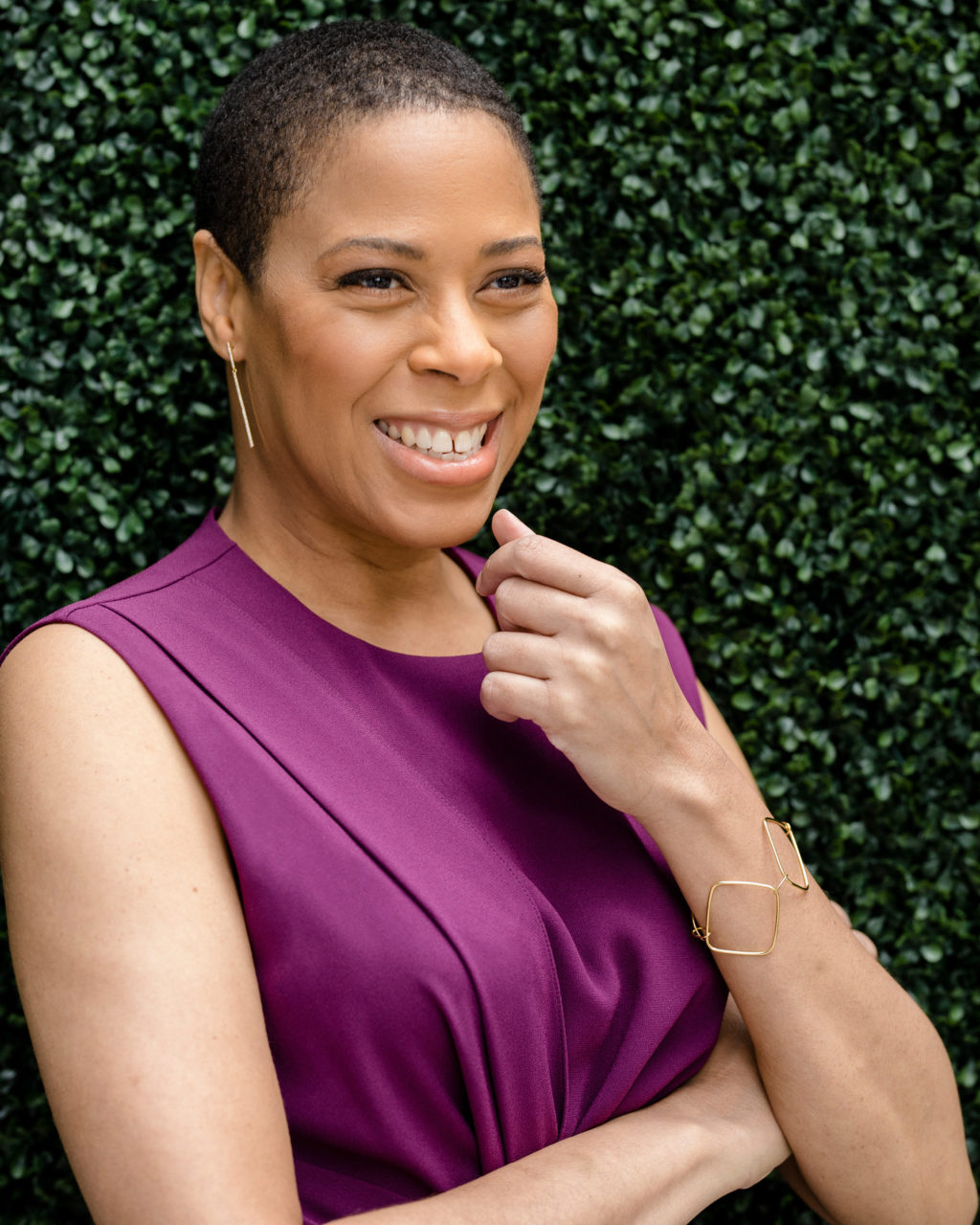
Orelon wears the Taylor dress in deep plum, the Williamina earrings, and the Galatea bracelet.
WHO KNOWS if my acting career will be successful. I’m still brand new, and I have what Buddhists call “beginner’s mind.” I am so green, and everything is so scary and new. That’s what I was looking for. I wanted something that scared and energized me. There’s a wonderful sense of comfort in knowing that I can walk into any TV station in this country and put on a broadcast, because I’m an expert in that. In one field, I’m at the top of my game, but in the other one, I’m a scared little mouse. It keeps me very humble, and it’s rejuvenating.
Photographs by Raymond Jones.





